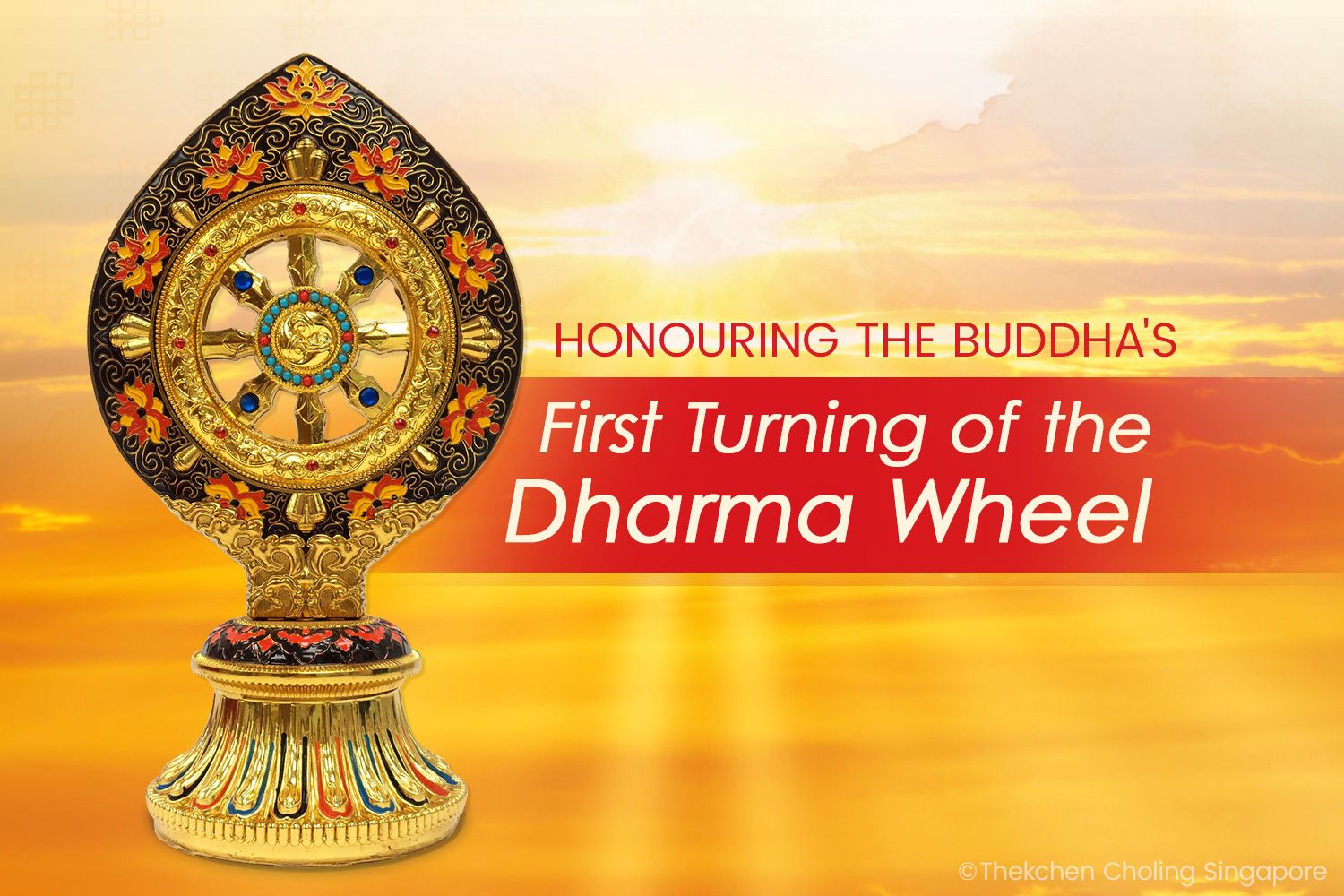Honouring the Buddha's First Turning of the Dharma Wheel

One of the most significant days in the Tibetan Buddhist calendar, Chokhor Düchen, also known as the “Festival of Turning the Wheel of Dharma”, commemorates the Buddha's first public teaching after his enlightenment. Chokhor Düchen occurs on the fourth day of the sixth month of the Tibetan lunar calendar, typically falling between July and August in the Gregorian calendar. The date varies each year, and in 2025, it will be on 28 July 2025, celebrated by Thekchen Choling Singapore.
This sacred occasion marks the moment when Shakyamuni Buddha, after attaining full awakening under the Bodhi tree, accepted the invitation of Indra and Brahma to share his realisations with the world. In response, he delivered the profound teaching of the Four Noble Truths to his five former companions in the Deer Park of Sarnath, thereby setting into motion the Dharma that would guide millions for centuries to come.
What are the Four Noble Truths?
1. The truth of suffering
Life in samsara is inherently unsatisfactory—it includes obvious pain, the subtle suffering of change (when pleasurable things inevitably shift), and the most all‑pervasive suffering rooted in ignorance and mental formations. Recognising this full spectrum of suffering is the essential first step towards liberation.
2. The truth of the cause of suffering
Suffering arises from causes: actions driven by karma and defiled states of mind like craving, ignorance, and attachment. As long as these mental afflictions remain, suffering will continue—like a leaky roof that must be fixed at its source, not merely mopped up.
3. The truth of the cessation of suffering
Because suffering has identifiable causes, it can be ceased—just as illness can end once its root causes are treated. This cessation isn’t a mere improvement, but a profound liberation that fully extinguishes mental defilements and karmic forces.
4. The truth of the path to the cessation of suffering
A clear path exists to achieve liberation from suffering’s causes. Through disciplined practice under the guidance of a qualified teacher, one can progressively eliminate ignorance and craving, leading to awakening and enlightenment.
The spiritual significance of Chokhor Düchen extends beyond the commemoration of a historical teaching—it’s a vivid reminder of the Buddha’s compassion in choosing to share his insights rather than remain in meditative seclusion. It symbolizes the beginning of the transmission of the Dharma and the establishment of the Sangha, the spiritual community. This event also represents the power of interdependence. Without the request from others, even a fully enlightened being may not teach. Thus, the holiday honors not just the Buddha’s wisdom, but also the conditions—such as the devotion of his students—that allowed the Dharma to flourish.
Merit-Multiplying Effect
Chokhor Düchen is a merit-multiplying day, a time when the karmic effects of any virtuous action are said to be multiplied 100 million times. This concept is rooted in the Vinaya teachings, which identify four such holy days throughout the year. Lama Zopa Rinpoche frequently emphasised that even the smallest act of virtue performed with good motivation on this day carries immeasurable benefit for one's spiritual development.
Recommended Practices
Attending a Dharma Teaching
At Thekchen Choling Singapore, Singha Rinpoche will be giving a Dharma teaching on this auspicious day. It is a day to gain multifold merits by contemplating the preciousness of the Dharma, making it a meaningful experience that will enrich and deepen one’s understanding of the Dharma on the path to awakening. By attending a Dharma teaching on this day, we are also creating the cause to always receive teachings in this life and in our future lives.
Conclusion
What makes Chokhor Düchen especially meaningful is its universality. While rooted in Tibetan Buddhist tradition, the essence of the holiday—celebrating the transmission of liberating truth—resonates with all schools of Buddhism. It invites each practitioner, regardless of background or lineage, to reflect on the timeless relevance of the Buddha’s first teaching: that suffering exists, that its cause can be known, that cessation is possible, and that there is a path leading to that freedom.
Come join us on this holy day, 28 July 2025, for a Dharma teaching by Singha Rinpoche at our Jalan Besar temple, Thekchen Choling Singapore, at 8pm!

